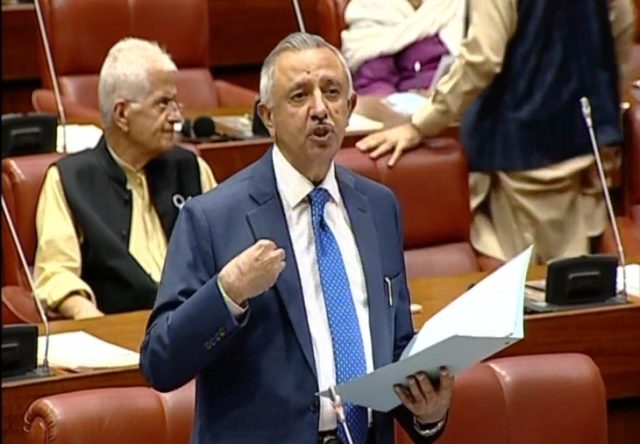ISLAMABAD, Thursday, May 22, 2025 (WNP): The Senate Standing Committee on Water Resources, chaired by Senator Shahadat Awan, on Thursday held a high-level session to discuss the recent developments surrounding the Indus Waters Treaty (IWT) in light of what it termed “hostile actions” by India.
The session featured a detailed briefing by Pakistan’s Commissioner for Indus Waters, Syed Muhammad Mehar Ali Shah, who emphasized that the treaty is a binding bilateral agreement that cannot be suspended unilaterally. “The Indus Waters Treaty remains fully enforced and legally binding on both Pakistan and India,” Shah stated. He termed India’s reported attempts to restrict the flow of western rivers as a “clear violation” of the treaty.
The Committee collectively condemned what it described as India’s “unlawful and unilateral” move to suspend its obligations under the 1960 treaty, following a controversial false flag operation in Pahalgam. Lawmakers warned that such provocative actions pose a serious threat to Pakistan’s water security, agriculture, and the livelihoods of over 250 million citizens.
“This treaty is not just a document—it is a matter of our national survival,” Senator Awan asserted. “Water is our red line.”
The Committee cited Article XII, Clause 4 of the Indus Waters Treaty, as well as the Vienna Convention on the Law of Treaties (1969), both of which prohibit unilateral withdrawal or suspension. The Committee also noted the World Bank President’s recent affirmation that the treaty continues to bind both parties and cannot be placed in abeyance by one side.
Emphasizing the treaty’s critical importance for Pakistan as a lower-riparian state, the Committee underscored the country’s growing vulnerability to climate change and irregular monsoon cycles. Members stressed the need for consistent water flow for food security and economic stability.
The Committee also strongly condemned what it termed an “unprovoked Indian attack” on the Neelum-Jhelum Hydropower Project, labeling it “water warfare and aggression,” and an act that threatens regional peace.
“The weaponization of water is a red line for the Pakistani nation,” the Committee stated, warning that such actions could jeopardize the recently revived ceasefire between the two neighbors.
Calling on the international community to take immediate notice, the Committee urged global actors to pressure India to uphold its international commitments. “Every drop of water allocated to Pakistan under the Treaty is our rightful share, and we will defend it legally and politically on every platform,” the statement said.
While reaffirming Pakistan’s commitment to a peaceful resolution of all outstanding disputes with India, including the issue of Jammu and Kashmir, the Committee made it clear that the country would not compromise on its core water rights.
“Any threat to our water security is a threat to our very existence. We are confident that Pakistan’s armed forces stand ready to defend our sovereignty and secure our national interests,” the Committee concluded.
The meeting was attended by Senators Faisal Saleem Rahman, Saadia Abbasi, Mohammad Humayun Mohmand, and Poonjo Bheel, as well as Federal Minister for Water Resources Muhammad Mueen Watto, Water Resources Secretary Syed Ali Murtaza, and Commissioner for Indus Waters Syed Muhammad Mehar Ali Shah, among other officials.




